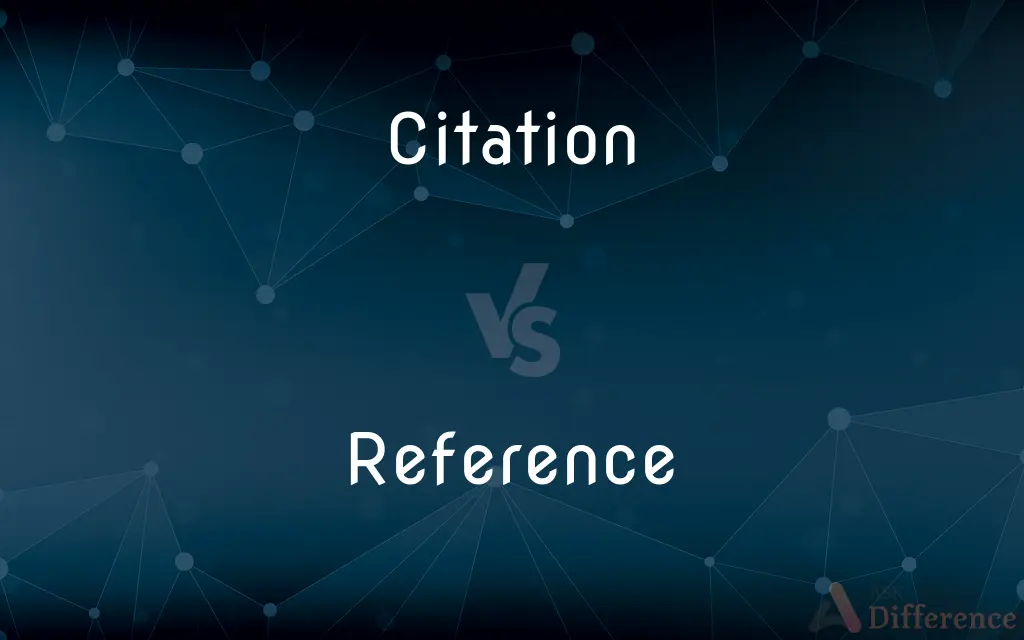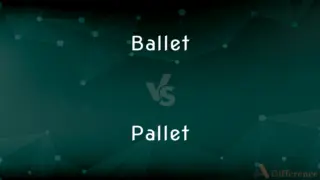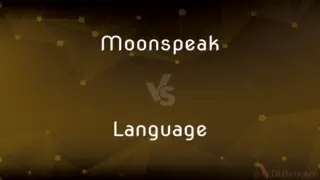Citation vs. Reference — What's the Difference?
By Maham Liaqat & Urooj Arif — Updated on March 13, 2024
A citation is a brief mention within the text that acknowledges the source of information, whereas a reference provides detailed information about the source at the end of the document.

Difference Between Citation and Reference
Table of Contents
ADVERTISEMENT
Key Differences
Citations are used within the body of a work to indicate where specific information was found, typically including author name and publication year. They serve to credit the original authors while allowing readers to identify the source material quickly. References, on the other hand, appear in a reference list or bibliography at the end of a document, offering a comprehensive account of the source, including the title, author, publication date, and publisher. This detailed information enables readers to locate and consult the sources themselves.
While citations are brief and appear in the text to avoid interrupting the flow of reading, references are more detailed and located at the end of the document to provide a thorough background on the sources cited. Citations often follow a specific formatting style, such as APA, MLA, or Chicago, which dictates how to include the author's name, year of publication, and page numbers if necessary. References, although also adhering to these styles, require a more extensive format that includes full titles, full names of authors, and publication details.
Citations function as a part of the narrative or argument, helping to bolster the writer's points by referring to authoritative sources. They are integral to the text, guiding readers to the reference list for more details. References complement citations by ensuring that the information is verifiable and that credit is appropriately given to the original sources. This system of citation and reference fosters academic integrity and intellectual honesty.
In academic writing, the use of citations and references is crucial for avoiding plagiarism. Citations within the text quickly show the reader where an idea or quote originates, while the reference list provides a roadmap to the research and literature that underpin the work. This relationship underscores the importance of both elements in scholarly communication.
Both citations and references are essential components of academic and professional writing, serving complementary roles. Citations weave external evidence into the fabric of a document, enhancing credibility and argumentation, while references provide the necessary details to trace the origin of this evidence, ensuring transparency and accountability in the use of source material.
ADVERTISEMENT
Comparison Chart
Location
Within the text
At the end of the document
Purpose
To credit sources and guide readers to references
To provide detailed information about the source
Content
Author's name, year of publication
Full details of the source
Function
Enhances credibility, supports argumentation
Enables verification, fosters academic integrity
Formatting Styles
APA, MLA, Chicago (varies by style)
Detailed format including full publication info
Compare with Definitions
Citation
A note in the text that refers the reader to the source listed in the reference section.
See the citation for more details on the theory's background.
Reference
A detailed listing of a source used in the preparation of a document.
Each reference at the end of the paper must correspond to a citation in the text.
Citation
A way to give credit to the sources used in writing a paper.
Proper citation helps avoid plagiarism.
Reference
The act of providing a list of sources at the end of an academic work.
Reference formatting should adhere to specific style guidelines.
Citation
A mention in the text acknowledging the source of information or ideas.
According to Smith (2020), citations are crucial for academic integrity.
Reference
A comprehensive description of a source that backs up the content of a document.
For further reading, consult the reference section.
Citation
A reference to a book, paper, or author, especially in a scholarly work.
The citation should include the author's last name and the year of publication.
Reference
An essential component of academic writing that ensures the verifiability of information.
The reference list enhances the document's credibility by detailing the research foundation.
Citation
A brief indication of source material that supports a statement or idea.
The study's findings (Johnson, 2018) reinforce this argument.
Reference
Information provided so a reader can locate the source mentioned.
References must include the author, title, publication year, and publisher.
Citation
A citation is a reference to a source. More precisely, a citation is an abbreviated alphanumeric expression embedded in the body of an intellectual work that denotes an entry in the bibliographic references section of the work for the purpose of acknowledging the relevance of the works of others to the topic of discussion at the spot where the citation appears.
Reference
Reference is a relationship between objects in which one object designates, or acts as a means by which to connect to or link to, another object. The first object in this relation is said to refer to the second object.
Citation
The act of citing.
Reference
The act of referring to something
Filed away the article for future reference.
Citation
A quotation of or explicit reference to a source for substantiation, as in a scholarly paper.
Reference
Significance for a specified matter; relation or relationship
Her speeches have special reference to environmental policy.
Citation
(Law) A reference to a previous court decision or other authority for a point of law, usually by case title and other information.
Reference
Meaning or denotation
The reference of the word “lion” is to a kind of wild cat.
Citation
An official commendation for meritorious action, especially in military service
A citation for bravery.
Reference
A mention of an occurrence or situation
Made frequent references to her promotion.
Citation
A formal statement of the accomplishments of one being honored with an academic degree.
Reference
A note in a publication referring the reader to another passage or source.
Citation
An official summons, especially one calling for appearance in court.
Reference
The passage or source so referred to.
Citation
An official summons or notice given to a person to appear.
Reference
A work frequently used as a source.
Citation
The paper containing such summons or notice.
Reference
A mark or footnote used to direct a reader elsewhere for additional information.
Citation
The act of citing a passage from a text, or from another person, using the exact words of the original text or speech and giving credit to the original by referencing.
Reference
Submission of a case to a referee.
Citation
An entry in a list of sources from which information was taken, typically following a prescribed bibliographical style; a reference.
Reference
Legal proceedings conducted before or by a referee.
Citation
The passage or words quoted; a quotation.
Reference
A person who recommends another or who can vouch for another's fitness or qualifications, as for a job.
Citation
(lexicography) A quotation with attached bibliographical details demonstrating the use of a particular lexical item in a dictionary, especially a dictionary on historical principles.
Reference
A statement about a person's qualifications, character, and dependability.
Citation
Enumeration; mention.
It's a simple citation of facts.
Reference
To supply (a text) with references
The author hadn't adequately referenced the third chapter, so the copyeditor suggested adding more citations. This article is thoroughly referenced with up-to-date sources.
Citation
A reference to decided cases, or books of authority, to prove a point in law.
Reference
To cite as a reference
The monograph doesn't reference any peer-reviewed articles.
Citation
A commendation in recognition of some achievement, or a formal statement of an achievement.
Reference
Usage Problem To mention or allude to
The comedian's monologue referenced many Hollywood stars.
Citation
An official summons or notice given to a person to appear; the paper containing such summons or notice.
Reference
A relationship or relation (to something).
Citation
The act of citing a passage from a book, or from another person, in his own words; also, the passage or words quoted; quotation.
This horse load of citations and fathers.
Reference
A measurement one can compare (some other measurement) to.
Citation
Enumeration; mention; as, a citation of facts.
Reference
Information about a person, provided by someone (a referee) with whom they are well acquainted.
Citation
A reference to decided cases, or books of authority, to prove a point in law.
Reference
A person who provides this information; onlyn in UK English: a referee.
Citation
An official award (as for bravery or service) usually given as formal public statement
Reference
A reference work.
Citation
(law) the act of citing (as of spoken words or written passages or legal precedents etc.)
Reference
(attributive) That which serves as a reference work.
Reference Dictionary of Linguistics
Citation
A short note recognizing a source of information or of a quoted passage;
The student's essay failed to list several important citations
The acknowledgments are usually printed at the front of a book
The article includes mention of similar clinical cases
Reference
The act of referring: a submitting for information or decision.
Citation
A passage or expression that is quoted or cited
Reference
(semantics) A relation between objects in which one object designates, or acts as a means by which to connect to or link to, another object.
Citation
A summons that commands the appearance of a party at a proceeding
Reference
(academic writing) A short written identification of a previously published work which is used as a source for a text.
Citation
Thoroughbred that won the triple crown in 1948
Reference
(academic writing) A previously published written work thus indicated; a source.
Reference
(computing) An object containing information which refers to data stored elsewhere, as opposed to containing the data itself.
Reference
A special sequence used to represent complex characters in markup languages, such as
™ for the ™ symbol.Reference
(obsolete) Appeal.
Reference
To provide a list of references for (a text).
You must thoroughly reference your paper before submitting it.
Reference
To refer to, to use as a reference.
Reference the dictionary for word meanings.
Reference
To mention, to cite.
In his speech, the candidate obliquely referenced the past failures of his opponent.
Reference
(programming) To contain the value that is a memory address of some value stored in memory.
The given pointer will reference the actual generated data.
Reference
The act of referring, or the state of being referred; as, reference to a chart for guidance.
Reference
That which refers to something; a specific direction of the attention; as, a reference in a text-book.
Reference
Relation; regard; respect.
Something that hath a reference to my state.
Reference
One who, or that which, is referred to.
Reference
The act of submitting a matter in dispute to the judgment of one or more persons for decision.
Reference
Appeal.
Reference
A remark that calls attention to something or someone;
She made frequent mention of her promotion
There was no mention of it
The speaker made several references to his wife
Reference
A short note recognizing a source of information or of a quoted passage;
The student's essay failed to list several important citations
The acknowledgments are usually printed at the front of a book
The article includes mention of similar clinical cases
Reference
An indicator that orients you generally;
It is used as a reference for comparing the heating and the electrical energy involved
Reference
A book to which you can refer for authoritative facts;
He contributed articles to the basic reference work on that topic
Reference
A formal recommendation by a former employer to a potential future employer describing the person's qualifications and dependability;
Requests for character references are all to often answered evasively
Reference
The most direct or specific meaning of a word or expression; the class of objects that an expression refers to;
The extension of `satellite of Mars' is the set containing only Demos and Phobos
Reference
The act of referring or consulting;
Reference to an encyclopedia produced the answer
Reference
A publication (or a passage from a publication) that is referred to;
He carried an armful of references back to his desk
He spent hours looking for the source of that quotation
Reference
The relation between a word or phrase and the object or idea it refers to;
He argued that reference is a consequence of conditioned reflexes
Reference
Refer to;
He referenced his colleagues' work
Common Curiosities
Why are both citations and references important?
They are vital for academic integrity, allowing readers to verify sourced information and giving proper credit to original authors, thus avoiding plagiarism.
How do citations and references differ in purpose?
Citations credit sources directly within the text and guide readers to the detailed listings in the reference section, while references provide comprehensive information about each cited source.
Can you use citations without references, or vice versa?
Typically, no. Citations and references work together to provide full credit to sources. Using one without the other may lead to incomplete information and can undermine the document's credibility.
What is a citation?
A citation is a brief mention within a document that acknowledges the source of information, typically including the author's name and publication year.
What happens if I make a mistake in a citation or reference?
Mistakes can lead to difficulties in locating the original source and may inadvertently contribute to plagiarism. Accuracy is crucial for the integrity of academic work.
What is a reference?
A reference provides detailed information about a source at the end of a document, enabling readers to locate and consult the source themselves.
Can the same formatting style be used for citations and references?
Yes, the chosen formatting style applies to both citations and references, ensuring consistency throughout the document.
How should citations and references be formatted?
Their formatting should follow specific style guidelines, such as APA, MLA, or Chicago, which dictate the presentation and structure of both citations and references.
How do citations and references contribute to the research community?
They facilitate knowledge sharing, enable the verification of data, and support the network of scholarly communication and academic dialogue.
Are citations and references required in all types of writing?
While essential in academic and professional writing, they may not be necessary in personal writing. However, crediting sources is always a good practice.
How does one choose between different citation styles?
The choice often depends on the discipline, with different academic fields preferring specific styles, or on publication requirements.
How do electronic sources affect citations and references?
Electronic sources require specific details like URLs or DOIs in references, and their citations must still follow the chosen style guide.
What are common mistakes to avoid in citations and references?
Common mistakes include incorrect author names, publication dates, or page numbers in citations, and incomplete or inaccurate information in references.
What information is included in a reference but not in a citation?
References include the title of the work, full publication details, and sometimes the page range, unlike citations, which are more concise.
Is it possible to have references without corresponding citations in the text?
Generally, all references should correspond to citations in the text. Listing sources not cited may be misleading or irrelevant.
Share Your Discovery

Previous Comparison
Ballet vs. Pallet
Next Comparison
Moonspeak vs. LanguageAuthor Spotlight
Written by
Maham LiaqatCo-written by
Urooj ArifUrooj is a skilled content writer at Ask Difference, known for her exceptional ability to simplify complex topics into engaging and informative content. With a passion for research and a flair for clear, concise writing, she consistently delivers articles that resonate with our diverse audience.














































